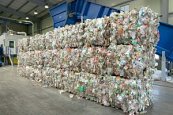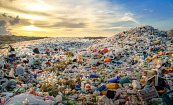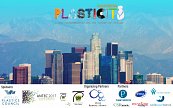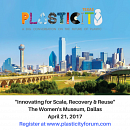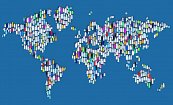China Offers Clues on What Types of Plastics Will be Allowed in to the Country
Published on 23 August 2017
Post-industrial recycled plastics are on the list of “restricted” imports, meaning they can still head into the country, but post-consumer plastics are another matter. This will cause companies and countries to look at the way they process their waste resource materials, and may drive innovation for onshore treatment. This is very relevant to the discussion at the Plasticity Sydney event on October 31st.
ABC Radio Sydney
Published on 11 August 2017
Radio interview on Wendy Harmer’s show – ABC Radio Sydney on Plasticity Sydney on Oct. 31st.
How Catalytic Philanthropy Can Solve Global Waste Issues
Published on 17 July 2017
Catalytic philanthropy is an opportunity to bridge the funding gap for small businesses and local operators in order to do their jobs effectively if given the equipment for better recycling and material recovery. This equipment is usually too “small” to qualify for bank loans or multilateral funding, and it is not something that venture capital or most other investors will seek out — at least until it is proven “at scale.” Only when small communities can be shown to make large, civic improvement with resource recovery, will replication and expansion of these systems, programs and methods take place.
Plasticity Forum to Host 8th International Plastics Sustainability Conference in Anaheim
Published on 05 May 2017
The Plasticity Forum presents ideas and opens up discussions on how to harness this material in new ways, both “pre” and “post” consumer use. The forum addresses design, materials, innovations, reuse and waste reduction in the aim of encouraging further innovation and collaboration, and there is no event quite like it in the world where this cross section of experts in the space come together to share knowledge and build collaborations.
It is open to innovators, entrepreneurs, industry leaders, packaging producers, recyclers, waste-to-fuel companies, brand leaders, retailers and manufacturers, educators, think tanks, government agencies, designers and investors.
Sustainability Efforts Reshaping Some Brands’ Food Packaging
Published on 01 May 2017
Brand owners and major retailers are responding to consumer demands and increasingly stepping up to “do the right thing” environmentally as they publicly commit to sustainable food packaging. These initiatives are designed to reduce packaging waste and encourage a shift to the circular economy.
The goal of the circular economy – currently a better-known concept in Europe than in North America – is to move from our traditional take-make-dispose economy, to one that has a closed loop, where materials, nutrients and data are continuously repurposed. One impact of such a concept is that it encourages greater use of biopolymers and recycled content in all appropriate types of packaging, including in food and beverage packaging.
"Plasticity Light" on Facebook Live - Summary Session for the Public at Earth Day Texas
Published on 22 April 2017
Watch the “Plasticity Light” session, held on Saturday for the public at Earth Day Texas (April 22nd). You can view the 90min session on Facebook Live, starting at the 1hr 25min mark.
This was a summary of Plasticity, with a few of our conference speakers: Stuart Clark of FOY Group, Trish Hyde of the Australian Packaging Covenant, Rachael Miller of Rozalia Project, Alvaro De Marichalar, and Bob Grace, of RC Grace Ltd., and Doug Woodring, Founder of the Plasticity Forum.
Earth Day Texas Event in Dallas Brings Together Experts to Tackle Plastic Pollution at Scale
Published on 21 April 2017
Plastic is among the most common types of pollution on Earth and is rapidly making its way into the oceans. Research published in the journal Science estimated that at least 5.3 million tons of plastic debris entered the world’s oceans in 2010.
On Friday, several environmentalists, financial experts and companies that manufacture and use plastic will meet in Dallas to work on tackling plastic pollution and potentially slow that flow.
Plasticity Texas Press Information
Published on 20 April 2017
Plasticity Forum is open to innovators, entrepreneurs, industry leaders, packaging producers, recyclers, waste-to-fuel companies, brand leaders, retailers and manufacturers, educators, think tanks, government agencies, designers and investors.
This year’s speakers include industry leaders from As You Sow, Chevron Phillips Chemical Company, Dell, Morgan Stanley and others.
Opportunities for Plastics in a Circular World
Published on 19 April 2017
As world population increases, so does the consumption of resources as economies expand. Without arguing about whether some or all of these resources are finite, it is clear to many that to the extent we can recover material which has become waste after its initial use, the more likely we are to sustainably carry out those activities of consumption in the years to come.
Plastic is one material that binds our planet, both figuratively, in terms of packaging and widespread use in so many industries, but also in the way that when it becomes waste: it is shown to be present in most corners of the world. Plastic can be made from many non-petroleum sources, including even carbon dioxide, so some might suggest that this material is not under the immediate pressure facing many other resources.
Plastic Opportunities for Change
Published on 15 April 2017
Whether or not the ocean and our waters upstream are drivers for needed improvements in plastic pollution reduction, the health of our communities, and the customers we all need, should be incentive enough to demand and encourage management to really focus on being an active participant in the circular economy. Plastic pollution is now on the top of many environmental agendas, as it directly impacts the abilities of cities to be resilient, and “smart.” Governments can facilitate circularity and waste avoidance, but it is the private sector which will thrive on it once some good case studies are promoted, scaled and replicated.


